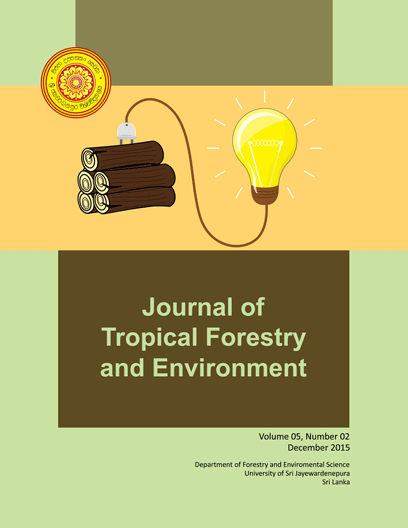Greenhouse Gas Emissions from Plantation to the Proceeded Wood Products via State Timber Corporation Depots for Selected Tree Species using Life Cycle Assessment
DOI:
https://doi.org/10.31357/jtfe.v5i2.2660Abstract
Life Cycle Assessment (LCA) provides a methodological framework for evaluating environmental performance over the life cycle of a product, process, or an activity. In Sri Lanka, majority of timber for wood based industries comes from homegardens and Government owned forest plantations. State Timber Corporation (STC) is the authoritative body for timber harvesting in state owned forest plantations. This LCA study was carried out to calculate Greenhouse Gas (GHG) emissions of the STC timber movements from the plantation to the finished product. The study concentrated on teak, eucalypt and mahogany species as they represented fast moving commercial timber of high significance. Assessment boundary was from the harvesting to the product. Updated emission factors were used to calculate the CO2 eq units. When considering the emissions during the process, the highest was recorded in the sawmilling process (48% from sawing, 9% from surfacing and 9% from drying). The transportation accounted for 31.25% of emissions while harvesting contributed to 6%. Other indirect emissions accounted for 2.75%.Downloads
Published
2015-12-29
How to Cite
Senadheera, D., Ranasinghe, D., Wahala, W., & Amarasekera, H. (2015). Greenhouse Gas Emissions from Plantation to the Proceeded Wood Products via State Timber Corporation Depots for Selected Tree Species using Life Cycle Assessment. Journal of Tropical Forestry and Environment, 5(2). https://doi.org/10.31357/jtfe.v5i2.2660
Issue
Section
Articles
License
The publisher retain the copyrights of contents published, and all open access articles are distributed under the terms of the Creative Commons Attribution-Noncommercial-No Derivative Works 3.0 Unported License[U1], which permits unrestricted use, distribution and reproduction in any medium, provided that the original work is properly cited.
You can download the Legal Code for this License at: http://creativecommons.org/licenses/by-nc-nd/3.0/legalcode


